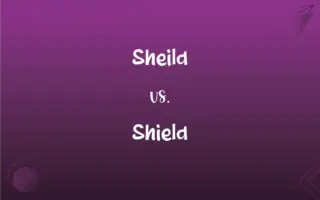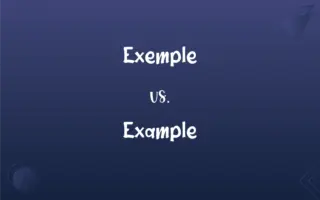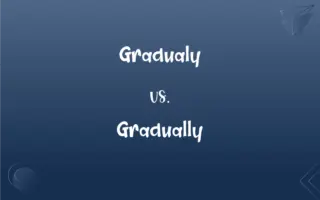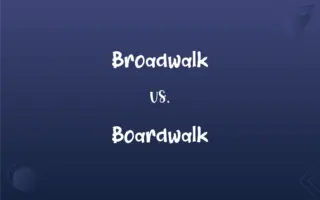Aquit vs. Acquit: Mastering the Correct Spelling
By Janet White || Updated on March 13, 2024
"Aquit" is an incorrect spelling. The right spelling is "Acquit," meaning to declare not guilty in a legal case.
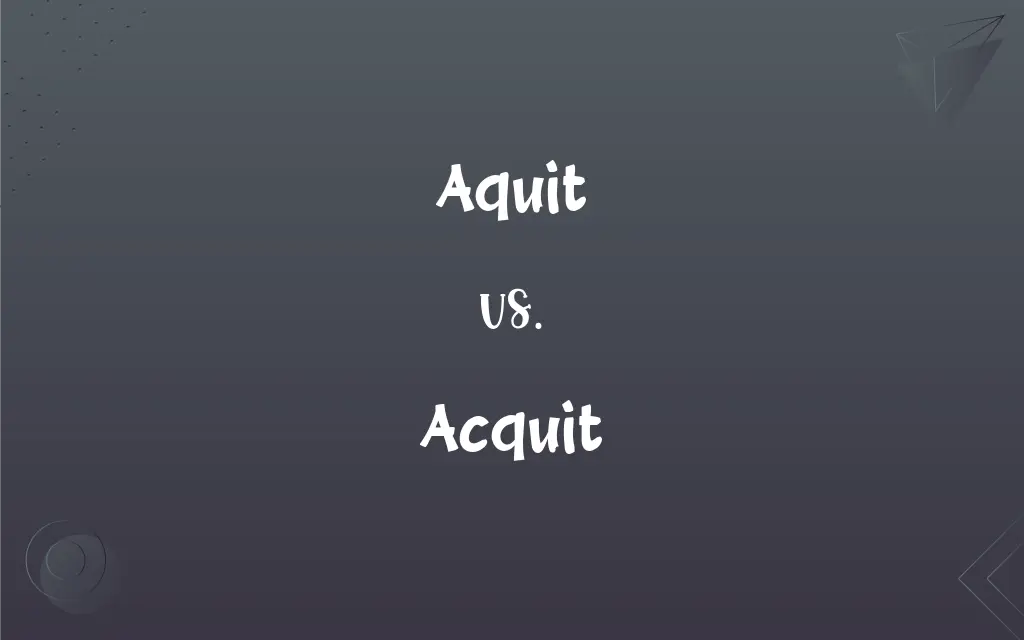
Which is correct: Aquit or Acquit
How to spell Acquit?

Aquit is Incorrect

Acquit is Correct
ADVERTISEMENT
Key Differences
Link "Acquit" to "Quit" – both have double "t" at the end.
Remember, "Aquit" lacks the full verdict; "Acquit" is complete with the "c."
Visualize a courtroom scene with the caption "Acquit."
Remember "acQuit" has a "c" before the "q", unlike "aQuit."
Associate "Acquit" with a balance of letters; both "a" and "c" balance before "quit."
ADVERTISEMENT
Correct usage of Acquit
She was confident her lawyer would aquit her name.
She was confident her lawyer would acquit her name.
He was hoping to aquit himself of the charges in court.
He was hoping to acquit himself of the charges in court.
Despite the evidence, they could not aquit him of wrongdoing.
Despite the evidence, they could not acquit him of wrongdoing.
Many believed the court would not aquit the accused.
Many believed the court would not acquit the accused.
The jury decided to aquit the defendant after the trial.
The jury decided to acquit the defendant after the trial.
Acquit Definitions
Acquit: to absolve someone from an obligation or duty.
He was acquitted from his duties.
Acquit: to conduct oneself or perform in a certain manner.
She acquitted herself well during the presentation.
Acquit: to settle or pay off a debt or obligation.
He acquitted his financial obligations promptly.
Acquit: to relieve or discharge.
He was acquitted of any wrongdoing.
(Law) To find not guilty of a criminal offense.
To conduct (oneself) in a specified manner
Acquitted herself well during the interview.
(Archaic) To release or discharge from an obligation, such as a debt.
(Obsolete) To repay.
(transitive) To declare or find innocent or not guilty.
(transitive) To discharge (for example, a claim or debt); to clear off, to pay off; to fulfil.
(transitive) Followed by of (and formerly by from): to discharge, release, or set free from a burden, duty, liability, or obligation, or from an accusation or charge.
The jury acquitted the prisoner of the charge.
(reflexive) To bear or conduct oneself; to perform one's part.
The soldier acquitted herself well in battle.
The orator acquitted himself very poorly.
(reflexive) To clear oneself.
Past participle of acquit.
To release, to rescue, to set free.
To pay for; to atone for.
Acquitted; set free; rid of.
To discharge, as a claim or debt; to clear off; to pay off; to requite.
A responsibility that can never be absolutely acquitted.
To set free, release or discharge from an obligation, duty, liability, burden, or from an accusation or charge; - now followed by of before the charge, formerly by from; as, the jury acquitted the prisoner; we acquit a man of evil intentions.
To clear one's self.
Pronounce not guilty of criminal charges;
The suspect was cleared of the murder charges
Behave in a certain manner;
She carried herself well
He bore himself with dignity
They conducted themselves well during these difficult times
Acquit: to free someone from a criminal charge by a verdict of not guilty.
The jury decided to acquit the defendant.
Acquit Sentences
They hoped the new evidence would help to acquit their client.
The jury is expected to acquit the accused due to lack of evidence.
Her ability to acquit herself in difficult situations is admirable.
The defense attorney fought hard to acquit the young man.
The court must decide whether to acquit the suspect or not.
To acquit oneself with dignity is important, no matter the circumstance.
His goal was to acquit himself well in the competition.
The evidence presented was compelling enough to acquit her.
The jury's decision to acquit was met with mixed reactions.
She managed to acquit herself of the accusations through a solid alibi.
He worked tirelessly to acquit himself of the wrongdoing he was accused of.
Acquit Idioms & Phrases
Acquit oneself of a duty
To fulfill a responsibility or obligation satisfactorily.
He acquitted himself of his duty as a juror with great seriousness.
Acquit oneself with honor
To conduct oneself with integrity and dignity.
She aimed to acquit herself with honor in all her professional dealings.
Acquit oneself well
To perform or conduct oneself in a specified manner, usually good.
Despite the pressure, he acquitted himself well during the presentation.
Seek to acquit
To attempt to clear oneself or another of a charge or accusation.
She sought to acquit her friend through gathering evidence in his favor.
Acquit without reservation
To clear of charges without any doubt remaining.
The jury acquitted her without reservation, finding the accusations baseless.
FAQs
Why is it called Acquit?
Derived from Latin "ad" and "quietus" meaning "to set at rest."
Which vowel is used before Acquit?
Typically, the preposition "of" as in "acquitted of."
What is the verb form of Acquit?
Acquit is a verb; its forms are acquit, acquitted, acquitting.
What is the pronunciation of Acquit?
/əˈkwɪt/.
What is the singular form of Acquit?
Acquit.
Is Acquit a negative or positive word?
Neutral, though the action it describes can be seen positively.
Which article is used with Acquit?
Typically, "to" as in "to acquit."
What is the plural form of Acquit?
Acquit is a verb and doesn’t have a plural form.
Is Acquit an abstract noun?
No.
What is the root word of Acquit?
From Old French "aquiter" derived from Latin "ad" and "quietus."
Is Acquit a vowel or consonant?
"Acquit" is a word, not a single letter.
Which preposition is used with Acquit?
"Of" as in "acquitted of charges."
Is Acquit an adverb?
No.
Which determiner is used with Acquit?
Acquit as a verb doesn't typically use a determiner.
Which conjunction is used with Acquit?
Any conjunction can be used depending on the sentence.
Is the word Acquit imperative?
It can be used in the imperative mood, as in "Acquit him now!"
What is another term for Acquit?
Exonerate.
What is the second form of Acquit?
Acquitted.
What is the third form of Acquit?
Acquitted.
Is Acquit a noun or adjective?
Verb.
Is Acquit a countable noun?
Acquit is a verb, not a noun.
Is the Acquit term a metaphor?
No.
What is the opposite of Acquit?
Convict.
What is the first form of Acquit?
Acquit.
Is Acquit a collective noun?
No.
How many syllables are in Acquit?
Two.
How do we divide Acquit into syllables?
Ac-quit.
What is a stressed syllable in Acquit?
The second syllable, "quit."
What part of speech is Acquit?
Verb.
How is Acquit used in a sentence?
"The judge decided to acquit her due to lack of evidence."
About Author
Written by
Janet WhiteJanet White has been an esteemed writer and blogger for Difference Wiki. Holding a Master's degree in Science and Medical Journalism from the prestigious Boston University, she has consistently demonstrated her expertise and passion for her field. When she's not immersed in her work, Janet relishes her time exercising, delving into a good book, and cherishing moments with friends and family.
